Politics (English)
Swiss National Councillor speaks clear language about refugee aid
21.11.2015
Subtitle "Afrikaans" was produced by machine.Subtitle "አማርኛ" was produced by machine.Subtitle "العربية " was produced by machine.Subtitle "Ārāmāyâ" was produced by machine.Subtitle "azərbaycan dili " was produced by machine.Subtitle "беларуская мова " was produced by machine.Подзаглавието "България" е създадено от машина.সাবটাইটেল "বাংলা " মেশিন দ্বারা তৈরি করা হয়েছিল।Subtitle "བོད་ཡིག" was produced by machine.Subtitle "босански" was produced by machine.Subtitle "català" was produced by machine.Subtitle "Cebuano" was produced by machine.Subtitle "ગુજરાતી" was produced by machine.Subtitle "corsu" was produced by machine.Podtitul "Čeština" byl vytvořen automaticky.Subtitle "Cymraeg" was produced by machine.Subtitle "Dansk" was produced by machine.Untertitel "Deutsch" wurde maschinell erzeugt.Subtitle "Untertitel" was produced by machine.Ο υπότιτλος "Ελληνικά" δημιουργήθηκε αυτόματα.Subtitle "English" was produced by machine.Subtitle "Esperanto" was produced by machine.El subtítulo "Español" se generó automáticamente.Subtitle "Eesti" was produced by machine.Subtitle "euskara" was produced by machine.Subtitle "فارسی" was produced by machine.Subtitle "Suomi" was produced by machine.Le sous-titrage "Français" a été généré automatiquement.Subtitle "Frysk" was produced by machine.Subtitle "Gaeilge" was produced by machine.Subtitle "Gàidhlig" was produced by machine.Subtitle "Galego" was produced by machine.Subtitle "Schwizerdütsch" was produced by machine.Subtitle "هَوُسَ" was produced by machine.Subtitle "Ōlelo Hawaiʻi" was produced by machine.Subtitle "עברית" was produced by machine.Subtitle "हिन्दी" was produced by machine.Subtitle "Mẹo" was produced by machine.Subtitle "Hrvatski" was produced by machine.Subtitle "Kreyòl ayisyen " was produced by machine.Subtitle "Magyar" was produced by machine.Subtitle "Հայերեն" was produced by machine.Subtitle "Bahasa Indonesia " was produced by machine.Subtitle "Asụsụ Igbo " was produced by machine.Textun"Íslenska" var framkvæmt vélrænt.Sottotitoli "Italiano" sono stati generati automaticamente.字幕は"日本語" 自動的に生成されました。Subtitle "Basa Jawa" was produced by machine.Subtitle "ქართული" was produced by machine.Subtitle "қазақ тілі " was produced by machine.Subtitle "ភាសាខ្មែរ" was produced by machine.Subtitle "ಕನ್ನಡ" was produced by machine.Subtitle "한국어" was produced by machine.Subtitle "कोंकणी語" was produced by machine.Subtitle "کوردی" was produced by machine.Subtitle "Кыргызча" was produced by machine.Subtitle " lingua latina" was produced by machine.Subtitle "Lëtzebuergesch" was produced by machine.Subtitle "Lingala" was produced by machine.Subtitle "ພາສາ" was produced by machine.Subtitle "Lietuvių" was produced by machine.Subtitle "Latviešu" was produced by machine.Subtitle "fiteny malagasy" was produced by machine.Subtitle "te reo Māori" was produced by machine.Subtitle "македонски јазик" was produced by machine.Subtitle "malayāḷaṁ" was produced by machine.Subtitle "Монгол хэл" was produced by machine.Subtitle "मराठी" was produced by machine.Subtitle "Bahasa Malaysia" was produced by machine.Subtitle "Malti" was produced by machine.Subtitle "မြန်မာစာ " was produced by machine.Subtitle "नेपाली" was produced by machine.Ondertitels "Nederlands" machinaal geproduceerd.Subtitle "Norsk" was produced by machine.Subtitle "chiCheŵa" was produced by machine.Subtitle "ਪੰਜਾਬੀ" was produced by machine.Podtytuł "Polska" został utworzony przez maszynę.Subtitle "پښتو" was produced by machine.Legenda "Português" foi gerada automaticamente.Subtitle "Română" was produced by machine.Subtitle "Язык жестов (Русский)" was produced by machine.Субтитры "Pусский" были созданы машиной.Subtitle "Kinyarwanda" was produced by machine.Subtitle "सिन्धी" was produced by machine.Subtitle "Deutschschweizer Gebärdensprache" was produced by machine.Subtitle "සිංහල" was produced by machine.Subtitle "Slovensky" was produced by machine.Subtitle "Slovenski" was produced by machine.Subtitle "gagana fa'a Samoa" was produced by machine.Subtitle "chiShona" was produced by machine.Subtitle "Soomaaliga" was produced by machine.Subtitle "Shqip" was produced by machine.Subtitle "србски" was produced by machine.Subtitle "Sesotho" was produced by machine.Subtitle "Basa Sunda" was produced by machine.Undertext "Svenska" är maskinell skapad.Subtitle "Kiswahili" was produced by machine.Subtitle "தமிழ்" was produced by machine.Subtitle "తెలుగు" was produced by machine.Subtitle "Тоҷикй" was produced by machine.Subtitle "ภาษาไทย" was produced by machine.ንኡስ ኣርእስቲ "ትግርኛ" ብማሽን እዩ ተፈሪዩ።Subtitle "Türkmençe" was produced by machine.Subtitle "Tagalog" ay nabuo sa pamamagitan ng makina.Subtitle "Türkçe" was produced by machine.Subtitle "татар теле" was produced by machine.Subtitle "Українська " was produced by machine.ذیلی عنوان "اردو" مشین کے ذریعہ تیار کیا گیا تھا۔Subtitle "Oʻzbek" was produced by machine.Subtitle "Tiếng Việt" was produced by machine.Subtitle "Serbšćina" was produced by machine.Subtitle "isiXhosa" was produced by machine.Subtitle "ייִדיש" was produced by machine.Subtitle "Yorùbá" was produced by machine.Subtitle "中文" was produced by machine.Subtitle "isiZulu" was produced by machine.
kla.TV accepts no liability for defective translation.kla.TV accepts no liability for defective translation.kla.TV accepts no liability for defective translation.kla.TV accepts no liability for defective translation.kla.TV accepts no liability for defective translation.kla.TV accepts no liability for defective translation.kla.TV не носи отговорност за некачествен превод.অপর্যাপ্ত অনুবাদের জন্য kla.TV কোন দায় বহন করে না।kla.TV accepts no liability for defective translation.kla.TV accepts no liability for defective translation.kla.TV accepts no liability for defective translation.kla.TV accepts no liability for defective translation.kla.TV accepts no liability for defective translation.kla.TV accepts no liability for defective translation.kla.TV nenese žádnou odpovědnost za chybné překlady.kla.TV accepts no liability for defective translation.kla.TV accepts no liability for defective translation.kla.TV übernimmt keine Haftung für mangelhafte Übersetzung.kla.TV accepts no liability for inadequate translationΗ kla.TV δεν φέρει καμία ευθύνη για ανεπαρκή μετάφραση.kla.TV accepts no liability for defective translation.kla.TV accepts no liability for defective translation.kla.TV no se hace responsable de traducciones incorrectas.kla.TV accepts no liability for defective translation.kla.TV accepts no liability for defective translation.kla.TV accepts no liability for defective translation.kla.TV accepts no liability for defective translation.kla.TV n'assume aucune responsabilité en cas de mauvaise traduction.kla.TV accepts no liability for defective translation.kla.TV accepts no liability for defective translation.kla.TV accepts no liability for defective translation.kla.TV accepts no liability for defective translation.kla.TV accepts no liability for defective translation.kla.TV accepts no liability for defective translation.kla.TV accepts no liability for defective translation.kla.TV accepts no liability for defective translation.kla.TV accepts no liability for defective translation.kla.TV accepts no liability for defective translation.kla.TV accepts no liability for defective translation.kla.TV accepts no liability for defective translation.kla.TV nem vállal felelősséget a hibás fordításértkla.TV accepts no liability for defective translation.kla.TV accepts no liability for defective translation.kla.TV accepts no liability for defective translation.kla.TV tekur enga ábyrgð á áræðanleika þýðingarinnarKla.TV non si assume alcuna responsabilità per traduzioni lacunose e/o errate.Kla.TV は、不適切な翻訳に対して一切の責任を負いません。kla.TV accepts no liability for defective translation.kla.TV accepts no liability for defective translation.kla.TV accepts no liability for defective translation.kla.TV accepts no liability for defective translation.kla.TV accepts no liability for defective translation.kla.TV accepts no liability for defective translation.kla.TV accepts no liability for defective translation.kla.TV accepts no liability for defective translation.kla.TV accepts no liability for defective translation.kla.TV accepts no liability for defective translation.kla.TV accepts no liability for defective translation.kla.TV accepts no liability for defective translation.kla.TV accepts no liability for defective translation.kla.TV accepts no liability for defective translation.kla.TV accepts no liability for defective translation.kla.TV accepts no liability for defective translation.kla.TV accepts no liability for defective translation.kla.TV accepts no liability for defective translation.kla.TV accepts no liability for defective translation.kla.TV accepts no liability for defective translation.kla.TV accepts no liability for defective translation.kla.TV accepts no liability for defective translation.kla.TV accepts no liability for defective translation.kla.TV accepts no liability for defective translation.kla.TV accepts no liability for defective translation.kla.TV aanvaardt geen aansprakelijkheid voor foutieve vertalingen.kla.TV accepts no liability for defective translation.kla.TV accepts no liability for defective translation.kla.TV accepts no liability for defective translation.kla.TV nie ponosi odpowiedzialności za wadliwe tłumaczenie.kla.TV accepts no liability for defective translation.kla.TV não se responsabiliza por traduções defeituosas.kla.TV accepts no liability for defective translation.kla.TV accepts no liability for defective translation.kla.TV не несет ответственности за некачественный перевод.kla.TV accepts no liability for defective translation.kla.TV accepts no liability for defective translation.kla.TV accepts no liability for defective translation.kla.TV accepts no liability for defective translation.kla.TV accepts no liability for defective translation.kla.TV accepts no liability for defective translation.kla.TV accepts no liability for defective translation.kla.TV accepts no liability for defective translation.kla.TV accepts no liability for defective translation.kla.TV nuk mban asnjë përgjegjësi për përkthime joadekuate.kla.TV accepts no liability for defective translation.kla.TV accepts no liability for defective translation.kla.TV accepts no liability for defective translation.Kla.TV tar inget ansvar för felaktiga översättningar.kla.TV accepts no liability for defective translation.kla.TV accepts no liability for defective translation.kla.TV accepts no liability for defective translation.kla.TV accepts no liability for defective translation.kla.TV accepts no liability for defective translation.kla.TV ንዝኾነ ጉድለት ትርጉም ዝኾነ ይኹን ሓላፍነት ኣይቅበልን እዩ።kla.TV accepts no liability for defective translation.kla. Walang pananagutan ang TV sa mga depektibong pagsasalin.kla.TV accepts no liability for defective translation.kla.TV accepts no liability for defective translation.kla.TV accepts no liability for defective translation.kla.TV عیب دار ترجمہ کے لیے کوئی ذمہ داری قبول نہیں کرتا ہے۔kla.TV accepts no liability for defective translation.kla.TV accepts no liability for defective translation.kla.TV accepts no liability for defective translation.kla.TV accepts no liability for defective translation.kla.TV accepts no liability for defective translation.kla.TV accepts no liability for defective translation.kla.TV accepts no liability for defective translation.kla.TV accepts no liability for defective translation.
This is a modal window.
The media could not be loaded, either because the server or network failed or because the format is not supported.
Swiss National Councillor speaks clear language about refugee aid
Almost everyone would agree on one point: refugees must be helped. The Geneva conven-tion on human rights demands that refugees must be sheltered if they are persecuted specifically and individually by state authorities of the country in which they possess citizenship. But this is where the great refugee controversy starts.
[continue reading]
Swiss National Councillor speaks clear language about refugee aid
Download broadcast and attachments in the wanted quality: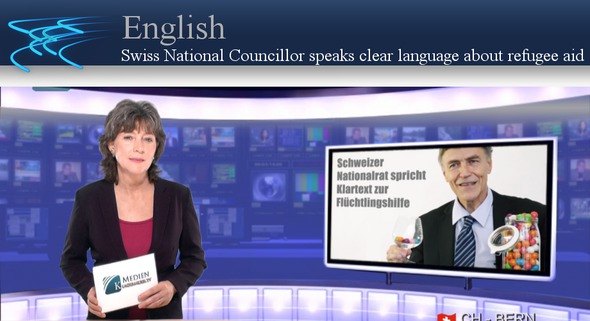
Useage rights:
Standard-Kla.TV-Licence
How EU governments instrumentalize the terror ...
Putin‘s speech at the 12th International ...
Swiss National Councillor speaks clear ...
How is money ruling over the waves of refugees ...
The political testament of Muammar Al-Khadafi ...
Alexander Lukashenko – The man who calls a ...
Instrumentalized "industries" – the refugee ...
Refugee crisis - young Syrian explains ...
Latest school shooting in the USA - When will ...
"Refugees Welcome" – A Disservice? ...
Streams of refugees: Turning chaos into an ...
US handwriting behind streams of refugees ...
Streams of refugees into the EU are a US ...
Refugee crisis in Europe – UNO adds fuel to ...
Escalation of refugees streaming through South ...
Globalization: key to global US-dominance ...
The US war for resources – Part 4 Iran ...
The US war for resources – Part 3 Greece ...
The US war for resources – Part 2 Russia ...
The US war for resources – part 1 ...
The Srebrenica-massacre and the arrest of ...
Russia’s red card for the warmongers ...
The Anti-Russia-“picking and choosing”: ...
G7 Summit - Who is responsible for the Ukraine ...
Trending on Kla.TV











1
www.kla.tv/30216 13:50 1st Analysis of “Sahara-Dust” availabe: Terrorism alarm! (by Ivo Sasek)

2
www.kla.tv/37362 34:08 Have the existence of viruses and contagion not been proven? Interview with Marvin Haberland from Next Level

3
www.kla.tv/31816 1:29:49 RESONANCE Beings of Frequency Documentary film by James Russell on the Dangers of Wireless Technology

4
www.kla.tv/37476 47:38 Why haven't we been back to the moon? - Interview with Bart Sibrel

5
www.kla.tv/30242 47:42 20. AZK - James Corbett Interview: Conflict in the Middle-East and Central Bank Digital Currencies: An absolute Horror Scenario

6
www.kla.tv/36674 30:45 Evidence in the Blood – A Visit with Funeral Director John O’Looney (Short Version)

7
www.kla.tv/37367 1:06 INVITATION – International Friends Meeting on Saturday the 3rd of May, 2025 - with Kla.TV founder Ivo Sasek.

8
www.kla.tv/37305 29:52 Heiko Schöning: Corruption Money for War and Pandemics

9
www.kla.tv/37533 28:20 Interview with Dr. Calin Georgescu The BIG „Change“ comes through the people

10
www.kla.tv/37225 27:00 A Crime Against Humanity: New mRNA Gene-altering Jabs for All



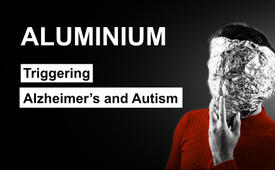







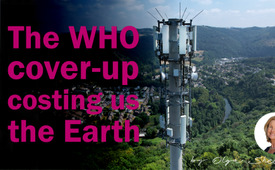
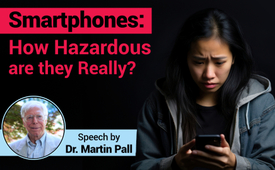

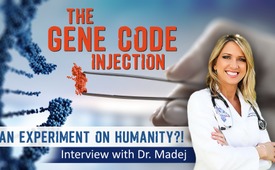



 Deutsch-ID setzten
Deutsch-ID setzten



Sendungstext
herunterladen
21.11.2015 | www.kla.tv/7164
Almost everyone would agree on one point: refugees must be helped. The Geneva conven-tion on human rights demands that refugees must be sheltered if they are persecuted specifically and individually by state authorities of the country in which they possess citizenship. But this is where the great refugee controversy starts. As kla.tv previously reported in several broadcasts, most refugees are not war refugees and certainly not politically persecuted. In other words most are not refugees in terms of the Geneva convention on human rights. Only in the first half of 2015, according to official statistics, more than 40% of first applications came from the Balkan states which are currently considered to be safe, namely Kosovo, Albania, Serbia, and Macedonia. The greatest part of refugees are economic migrants or refugees escaping poverty or other “freeloaders” who seize the opportunity. The big question that now arises is in which way these people can be helped best, and most sustainably. In our recent broadcast concerning how the asylum industry is eating up Germany’s future, we showed that in Germany, with only one million migrants, the asylum costs amount to a total of about 42 billion Euros annually. This amount equals the sum of the national budgets of no less than 11 German federal ministries alltogether: the family ministry, health ministry, finance ministry, Ministry of Environment, economics ministry, foreign office, German Bundestag (Parliament), Federal Audit office, Office of the Federal President, Federal Constitutional Court, and Federal Council. Another comparison to assess the volume: 42 billion Euros is what Germany needs every year for all unemployment benefits. With these vast amounts of expenses – at the taxpayers’ cost – all the poverty problems in this world and other causes of the refugee problems could be fought at their roots. The legitimate question must be raised: who is interested at all in fighting the refugee problem at its roots? The current refugee wave to Europe raises the strong suspicion that the whole refugee problem systematically and on purpose is to be shifted to Europe in an effort to weaken Europe. See our diverse broadcasts in which the backgrounds of this deliberately instigated refugee crisis are being enlightened. One individual taking up this question and speaking plainly is the Swiss politician Luzi Stamm. Stamm is a member of the Swiss People’s Party and member of the National Parliament since 1991. In the national elections on October 24th, 2015, Stamm was reelected with the third most votes in his state. Luzi Stamm was president of the Foreign Policy Committee (AKP) of the National Council during the years 2006 and 2007 and is a member to this day. The Foreign Policy Committee works in the areas of relations with other countries, relations to the European Union and international organizations, development cooperation as well as humanitarian aid, and more. Listen yourself to what the Swiss National Councillor from Aargau, has to say on refugee aid in his 9-minute video: This small green ball signifies one million people who intend to flee to Europe. There are people who say that Europe and especially Switzerland have to solve the worldwide poverty and the enormous refugee dramas by opening their borders to help these people. This is completely the wrong way. With the Parliamentary Foreign Policy Committee, we were just in Tunisia, Sicily and Italy. In 2014 Italy had chaotic situations as a result of having to receive 170,000 people. Let’s assume one million immigrants migrate into Europe over just one year – or another 170,000 or 160,000. Just now there are debates going on about how the 160,000 refugees are to be distributed throughout Europe? But these numbers are absolutely not comparable with the real problems. If you look into the Internet there are 395 million people on the verge of starvation, nearly 400 millions! Accommodating 1 million people in Europe – but 400 million worldwide are starving. According to statistics these people are earning less than 1 euro a day. If you consider those who earn less than 2 francs or 2 dollars then there are around 800 million in poverty. However, there are many more, there are 1.2 billion. There are 1.4 billion, 1.6 billion. There are apparently, or most likely 2 billion people earning less than 1 euro a day. These are those who, with certainty, are not able to spend thousands of dollars in smuggling fees to get to Europe. This is harsh poverty. Why are there people saying: If we take in 1 million annually, 2 million, 3 million of these refugees in Europe then we can solve the problems. They are not aware of the dimensions. Frighteningly, the statistics tell us that there are 65 million people who have already left their homeland and are on the run somewhere in the world. The most alarming is the population explosion. We can take in 5 million or even 10 million annually in Europe. Only the popu¬lation explosion shows how hopeless it is. Annually another 30-40 million are added; 35 million in one year, in the year 2016 the next 40 million. How does one get the idea that we can solve the problem by taking in more and more people? Why are there people in the Swiss parliament saying: We will take in 100,000 – this is Switzerland – 100,000 would be three times more than we receive today. We could take in 1 million. We could receive 1 million from Eritrea, from Somalia, from Nigeria. It is obvious that we will never be able to solve this dramatic problem this way. I was a member of the so-called Council of Europe in Strasbourg until 2007 – with 47 countries reaching far beyond the EU – and there I was part of the sub-commission on migration, the group responsible for handling immigration issues. There I had two colleagues. One always said: If Europe signals, for example to Africa or the Middle East, that Europe is an alternative then we release the largest mass migration world history has ever seen. He said: “This is irresponsible”. The other always said: “For heaven’s sake, don’t let them come. Let’s help them there! (Let us help them there, but don’t let them come to Europe!) “Why are there top politicians, the intellectual elite, who say: By opening the borders, we solve these problems? Why does the most powerful woman in the world, the German Federal Chancellor say “we will manage this”? Why does the Swiss President say: there are countries, such as Eritrea, where no one is sent back? It cannot work out well. According to common sense one has to say: If we have unlimited immigration, no one will make it! Of course, everyone is able to open up the borders – every child can do this – but all the problems related to this, we won’t manage them if it goes on like this. To simply open up the doors wide boundlessly is irresponsible. Just to open up the borders leads to chaos. The whole problem has a financial side to it. It is as irresponsible for us to just open up the borders, to open the doors completely, as it is for us to continue handling money as we are in the financial sector. Whoever wants to help in this world – if one sees these atrocious problems – has to ask himself: If I have a million, a billion available, where and how will I spend this money? And what is Switzerland doing now? This coin represents one million francs. Last year, 2014, Switzerland spent 55 million francs in the crisis area in Syria. Where urgent help is needed, in the border regions close to Turkey, Jordan, and Lebanon. 55 million francs! And what else does Switzerland spend? Switzerland spends, in just one year, an incredible 3.246 billion francs - so annually - for foreign aid, more than 3,000 million. But last year just 55 million for the region in Syria. It becomes even crazier if we consider what Switzerland is spending in our own country for the whole asylum system and refugee immigration problem. The Statistics are completely wrong. Look for example at someone who has to seek medical treatment in a hospital – these costs are nowhere to be found – they are paid for by the Swiss people via health insurance premiums or via hospital deficit. My National Council colleague from Zurich calculated that it is more than 7,000 billion francs a year that Switzerland spends in this category. If these numbers are right, it means, that Switzerland is spending an incredible 10 billion, more than 10,000 million, francs a year on the problem we are currently talking about. All this can be demonstrated visually: These are 2,500 coins, they represent 2.5 billion francs. Now there are 5 billion, now 7.5 billion and now there are 10 billion. In addition to these 10 billion there would be another 378 million, maybe another 50 million for translators, 50 million for lawyers, 100 million for medical treatment, doctors, dentists, psychiatrists, or for the social security office and so on. I filled the additional 378 million from the tube into this glass, again 378 coins. This is the wrong way. These vast sums are spent completely wrongly; they should be invested in the conflict area itself. In the conflict area where each franc spent offers infinitely more humanity and help. For heaven’s sake, let’s help them there – and certainly not just open the borders and invite them to Europe. National Councillor Luzi Stamm Member of the Foreign Policy Committee of the Swiss National Council (2 years as president) Member of the Council of Europe in Strasbourg 2003 to 2007
from dd.
http://www.luzi-stamm.ch/